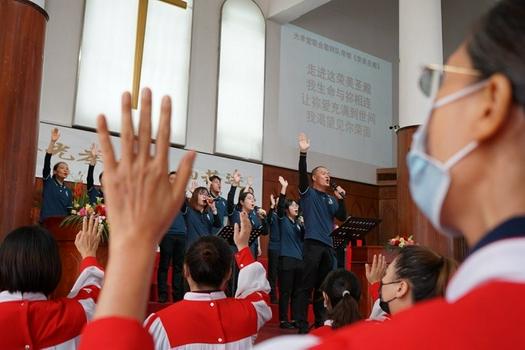There are a variety of praise and worship styles within the Church in China, which have always sparked controversy.
A male believer named Gu Hua (pseudonym), who has served as a worship ministry worker in East China for nearly twenty years, shared with an online Chinese Christian newspaper, the Christian Times, his perspective on how to view different styles of church music.
Gu Hua introduced the idea that in Western countries, church music is often not distinctly separated from secular music. Only music professionals could discern some subtle differences, such as church music being lighter in style and the arrangement of instruments being somewhat different from secular music.
However, in China, there is still a very clear distinction between church music and secular music. Gu believed that the music style of Stream of Praise (SOP) Music Ministries maintained a strong religious character, while it was challenging to determine whether Joshua Band's style leaned more towards pop or church music.
Regarding the Hillsong Worship in the West, Gu Hua said once he attended one worship service they hosted, and almost all the hymns were rock-style. But not all of their songs are like that, as some are quieter. He also thought that Hillsong Worship had some very well-written lyrics.
Gu Hua believed that church songs are meant to glorify God, but at the same time, they serve as a bridge for people to approach God. He said that some well-written hymns make people reflect on themselves just by listening to them. For example, they can reflect on the quality of their relationship with God or issues related to sin. He stated that some of the songs from the Taiwanese ministry Heavenly Melody were written excellently, and even though they might be considered outdated by now, many people continued to sing them.
He said, "Although I personally may not like one style or another, it doesn't mean I don't support them. As long as it's a Christian ministry and contributes to the development of the Church of China, I will support it."
"Furthermore, music itself is subjective; some people like one style, while others prefer another. This is all acceptable. You can't say that because you don't like a certain style, it's not good; it just may not be your preference or style," he commented.
Some church members sing mostly classic hymns, while others focus on very modern ones, but both styles are good and can touch the hearts of those attending the gatherings, he added.
Elderly church members might prefer classic hymns with slower rhythms, while young people might like to sing faster and more intense songs, such as songs from Hillsong Worship.
Gu mentioned that the leadership during praise and worship is also crucial. Some leaders sing very well and are skilled, but they do it solely for performance, lacking the anointing and the work of the Holy Spirit. On the other hand, some individuals might have limited vocal singing skills, but when they lead worship, they can deeply move people, leading to profound repentance and reflection. Gu Hua declared that this is genuine worship.
In his view, humans do not possess the ability to bring people back to God, no matter how technically proficient they are or how well they convey emotions. He emphasized that whether it is the preaching of pastors or the worship of believers, their ultimate goal is to lead people to repentance. If a person can only find the songs enjoyable during worship but don't experience repentance, then, at least for that person, it is not true worship.
- Translated by Abigail Wu












